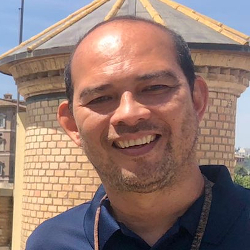 The Social Justice and Ecology Secretariat (SJES) held its annual meeting from 10-14 May at the Jesuit Curia in Rome. After some years of meeting online, the 20 attendees were happy to finally interact in person. Indeed, there were many things to be grateful for, but I wish to highlight three learning experiences.
The Social Justice and Ecology Secretariat (SJES) held its annual meeting from 10-14 May at the Jesuit Curia in Rome. After some years of meeting online, the 20 attendees were happy to finally interact in person. Indeed, there were many things to be grateful for, but I wish to highlight three learning experiences.
The first was getting a deeper sense of the global network of the social ministry of the Society of Jesus. The weeklong gathering was composed of six conference social delegates, six members of the SJES Advisory Committee, four leaders from the Global Ignatian Advocacy Network (GIAN), and staff members of SJES led by Fr Xavier Jeyaraj SJ. The official representative of our Jesuit conference was Fr Adri Suyadi SJ, as secretary of the Social Apostolate, but since he was also a delegate at the Province Congregation of Indonesia, he had asked me to participate in the SJES meeting instead.
It was both consoling and challenging to listen to the social delegates of the five other conferences. Despite the lingual, cultural, and geographic differences, there were many common experiences. The onset of Covid-19 caused various difficulties for everyone, and all had to seek creative ways to sustain the networks. Moving to online platforms was necessary but could not replace the in-person meetings.
The climate and ecological crises are being increasingly felt across the globe, albeit in different ways. For example, it was shared that the increasing production of electric vehicles is demanding more earth metals for the car’s lithium-ion battery, such as cobalt. The Democratic Republic of Congo holds around 51 per cent of the world’s cobalt reserves, thus escalating the pressure on the mines in Congo, and intensifying child labour and other dangerous or degrading practices.
The second learning was around networking. For a few years now, this group has been working on a document on networking, particularly concerning GIAN, which operates under SJES. GIAN is made up of four global networks—Education, Justice in Mining, Ecology (Ecojesuit), and Migration—whose mission is to facilitate sharing and collaboration within and among the different Jesuit conferences. At first, the document may seem quite technical, especially with its weight on defining the structure and internal operations of GIAN, and specifying how the networks should relate with the conference presidents and the social delegates. However, recalling Decree 2 of General Congregation 35 and the emphasis on discernment, collaboration, and networking, the GIAN document also encourages networking as a way of proceeding for our organisations. This does not mean sacrificing our place with the poor, which is really the fount of creativity and the Spirit.
Finally, the meeting with Fr General Arturo Sosa SJ was a fine learning moment. We were asked to write questions or suggestions for him about the social ministry. His response was on a different level and surpassed our expectations. It was less of a business meeting and more like a spiritual encounter. Speaking with great breadth and depth on the history of the Society and its contemporary context, Fr General stressed the necessity of maintaining creative tensions and how the loss of tensions would lead to a diminishment of our ministries. He expressed the need for greater social analysis and reflection to complement the social work on the ground. I further understood from him that our present reflections and practice of poverty should eventually lead to a deeper sense of personal and communal humility. There were many other points, and the richness was slowly relished over the next days.
In the end, it was an enriching meeting permeated with inputs, prayer, spiritual conversations, and gelatos together. It is hoped that by nourishing these connections among friends, organisations, and networks, it will bear fruit in greater service of God’s people.
 Fr Gabriel Lamug-Nañawa SJ is the JCAP Coordinator for Reconciliation with Creation
Fr Gabriel Lamug-Nañawa SJ is the JCAP Coordinator for Reconciliation with Creation

